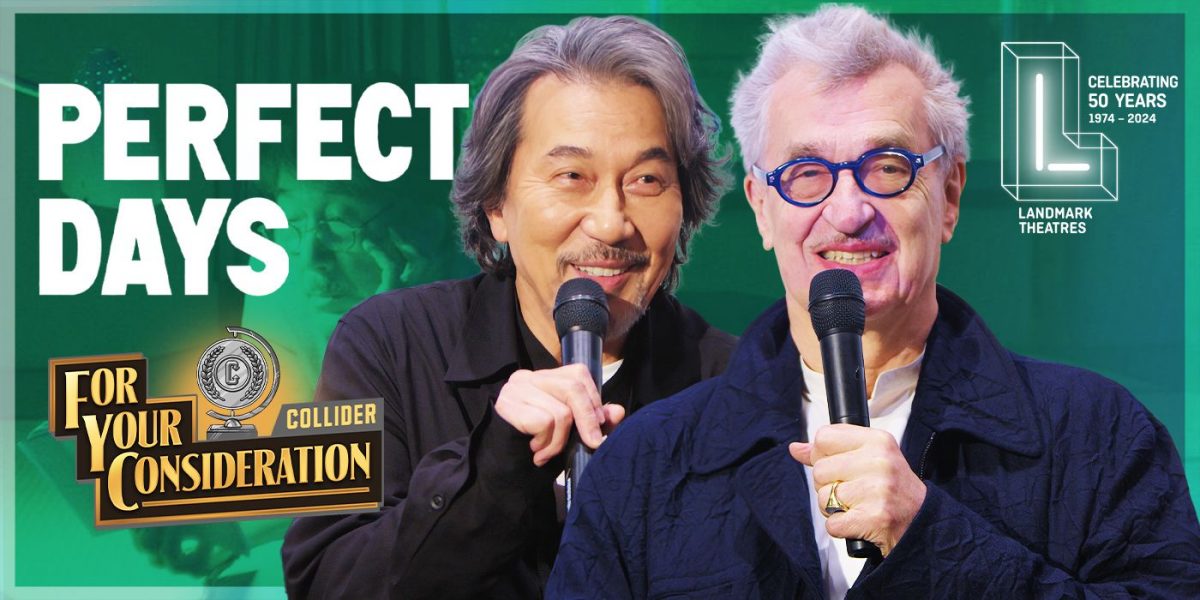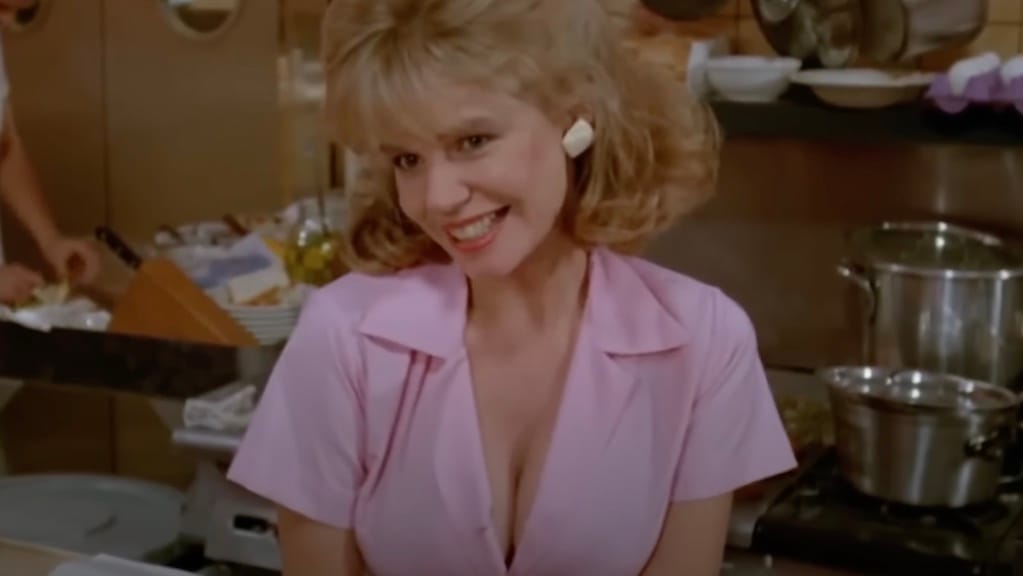
This Oscar-Nominated Film Has the Best Final Scene of 2023
Feb 22, 2024
The Big Picture
Perri Nemiroff moderates a Collider FYC Q&A with
Perfect Days
co-writer and director Wim Wenders, and star Kōji Yakusho.
Perfect Days
is nominated for Best International Feature at the Academy Awards.
During their conversation, they discuss why they agreed to make a film about public toilets, their collaboration on set, and how they crafted the best final scene in 2023.
Public toilets may not seem like a feature film-worthy topic. To Oscar-nominated filmmaker Wim Wenders, however, the inspiration from The Tokyo Toilet project in a post-pandemic world sparked an idea that would go on to become the critically acclaimed and Oscar nominated movie Perfect Days starring Kōji Yakusho. In celebration of the film’s Best International Feature nomination, Wenders and Yakusho joined us for an FYC screening and Q&A at Landmark Theatres in Los Angeles where Collider’s Perri Nemiroff sat down with the duo to discuss their experience turning the original pitch of making four or five short films about public toilets in Tokyo into a deeply moving and widely beloved Oscar nominated feature film.
Yakusho leads Perfect Days as Hirayama, a man who enjoys a simple, peaceful routine of watering his plants, painstakingly choosing the perfect tunes for his morning drive to work, reading books, and cleaning the public toilets of Tokyo. As much as Perfect Days is a celebration of the quiet moments in life, Hirayama’s untold backstory and the circumstances that led to his meticulously cultivated life run much deeper.
You can watch the full Q&A in the video above or you can read the transcript below to learn what struck Wenders most about that original pitch, how Kōji Yakusho became attached to the project, why they filmed most of the movie like a documentary, and then some.
Perfect Days A janitor in Japan drives between jobs listening to rock music.Director Wim Wenders Cast Kôji Yakusho Runtime 123 minutes Main Genre Drama
Read Our ‘Perfect Days Review
How Toyko Toilets Inspired an Oscar Nominated Feature Film
Image via DCM
PERRI NEMIROFF: Wim, I know this was first pitched to you as a series of short films about public toilets. What was your first reaction to that pitch, perhaps the thing you were most excited to explore, but then can you also tell me something you learned about public toilets in Japanese culture that wound up being a bigger influence on the film than you ever could have imagined at the start?
WIM WENDERS: Well, frankly, my first reaction was, when I only read the first page of the invitation, I just read, “Come to Tokyo …” I can read quickly, “Come to Tokyo … toilets.” “Oh, no.” Why would I go to look at toilets? But then I turned the page and I saw the toilets and understood thatit was an art project and a social project. I realized that it was 15 great architects, and some of them I knew. Tadao Ando is a personal, good old friend of mine. And normally these guys build banks and museums, and now they build a toilet and that is amazing in itself. And I thought, “Well, I should at least go and look at these toilets.” If they ask me to do something and be inspired, what else do you want?
And being invited to go to Tokyo? [Laughs] I love Tokyo. I hadn’t been there for a long time, and it was still not possible to go there in ‘22 because it was still blocked for foreigners. The people of Tokyo were, when the letter was written, still in lockdown. So when I came there in May ‘22, I checked out the toilets and I was quite impressed. But I also saw the people, the Japanese people, the Tokyoites who came back, finally, after the longest lockdown in history, and that was, for me, the event. How they took possession of their city was so drastically different from anything I’d seen in Europe, where that comeback out of the lockdown was like there was no tomorrow. Cities were ruined afterwards, parks were ruined, people had lost all sense of decency. I mean, public behavior. The parks where I live in Berlin were all garbage heaps. It seemed the big victim, at least in my part of the world, of the pandemic was a sense of the common good.In Japan, I saw the opposite. It was really endearing to see how respectful they treated their public places and also these toilets. That’s when I thought, “As much as I like these toilets and these architects, there is something bigger to do here.”
And as these people had invited me to be inspired, I told them the truth, and I thought I was probably talking myself out of a good job. I said, “I don’t think I’m the man to do these short documentaries on the architects and their creations. I sense there is something much more important here after the pandemic, and that there is something to be done right now in Japan about something that the world could learn from.” To my amazement, they looked at me and said, “Can it be done? A real feature film?” I said, “Yes, all we need is a good script and a great actor.” And that was the beginning of a long friendship.
Related The 10 Best Wim Wenders Movies, Ranked “Sex and violence was never really my cup of tea; I was always more into sax and violins.”
So you decide you want to turn this idea into a feature film and you know you want to make it about one main character. Was there any workshopping necessary to figure out the best main character to serve the version of this story you wanted to tell?
WENDERS: No. [Laughs] I knew the work of Kōji Yakusho. Actually, I have a very personal story. I knew all of his films. I knew Babel, Tampopo. I’d seen him in samurai movies and cop movies, because from the beginning when I first saw him, I realized he was very, very special. If you want me to, I’ll tell you, as I’m a movie director, I got the job in the Wenders family to select the Christmas movie for the entire family, and that’s a lot of people. This is old folks and young folks and middle-aged, and this is a disastrous job, I tell you. You can only go wrong. It’s either the young who don’t like it or the old who don’t like it. You never win. I want to give up on this job, but I’m stuck with it. The only time it ever worked gloriously was when I showed them Shall We Dance? That’s when I discovered him and I realized he has something that I’ve never seen again. His eyes are so effective and he has such kindness in his look, and he’s such a kind spirit. So when I was asked, “Which actor do you want?” There were no two questions about it. And the next day they came back and said, “We asked him and he said yes. If you want to make this film, if Wim Wenders is gonna make this film, he said, I’m gonna be in it.” You see? It’s easy!
Then I had to leave Tokyo again, and the screenwriter, or the guy who had invited me in the first place, he’s a great Japanese writer also, and poet, and I said, “I’m gonna write the movie with you.” He liked the idea. I said, “You just come with me to Berlin because we can’t write it here. I have to go back.” I was on another movie. Is there any screenwriter in the room? I have to tell you the truth. We wrote this thing in four weeks. Don’t hate me now. [Laughs]
Image via Janus Films
Kōji, can you tell me something about your process that stays the same from film to film, character to character, but then can you tell me something unique that this character demanded during the prep process?
KŌJI YAKUSHO: First of all, thank you very much for coming to the theater at a time when the Super Bowl is about to start. [Laughs] We appreciate you all being here.
WENDERS: It hasn’t started. You haven’t missed anything.
YAKUSHO: So, first of all, I spent about two days cleaning toilets with one of the cleaners from The Tokyo Toilet project, and I learned from them firsthand how to clean the toilets correctly. I was waiting for our director to arrive in Japan. At the Tokyo Film Festival, there was a time when I was actually, in the past, in the waiting room, and I remember seeing director Wim Wenders off in the distance and I thought there was a moment that we met eyes, actually. And so I bragged to my friend, “I met eyes with director Wim Wenders!” The first time that I met Wim, I wanted to tell him this story, so I did, and he said he didn’t remember this moment. [Laughs] So I’m just really grateful that he used me for this film.
WENDERS: I was too shy to look in your direction. [Laughs]
What Is Hirayama’s Backstory in ‘Perfect Days’?
Image via Neon
One of my favorite qualities of your performance in this movie is that you exude so much history with this character without the movie needing to spell it all out. Did you do any backstory work yourself, and if so, is there anything in particular we can feel informing your performance even though we don’t see or hear about it directly in the film?
YAKUSHO: Normally, in this case, our director and Mr. [Takuma] Takasaki, the co-writer of the script, did not really include any explanation about the history of the character. But it was really beautifully written, and so I feel that it’s the actor’s job to create this background. Still, during the shoot, there was this memo that Wim gave me during that time that had the past of the character, in particular the relationship of him and Komorebi, and that was really a helpful thing leading up to the last scene in the film, so I’m grateful that he shared that.
WENDERS: We had indeed decided, as we were writing the script, to not fill in all the background but let you, the audience, guess a lot of it and just have a few hints, like the niece arriving or the sister arriving. The sister, obviously, with a big limousine, and wondering why he lives in such a dump, and asking him, “Is it true that you’re really cleaning toilets?” So she comes from a different background and we guess that’s his background, too. So that’s all we put into the script, but you feel that. You sense that he is not born a toilet cleaner, that he had another more privileged life before, and we felt that was enough. But when Kōji-san asked me, it was to make sure that he didn’t make it up on his own, but to share a backstory. And, of course, he was the only one who had a right to know it so I had written three pages in preparation for the film, and so we translated it and gave it to Kōji-san, and he was quite happy and he said it coincided with his own idea because actors really always need a biography of a character. It helps so much for every action. I think the biography was helpful, but then again, we still didn’t feel like spitting it out. So forgive us if I’m not more explicit because I feel like I’m betraying our work if I now start telling you the whole background story that we made up in order to decide that you would never know it. [Laughs]
‘Perfect Days’ Final Shot Brought the Crew to Tears
I have to ask about that final shot. Wim, for you, what kind of direction and notes do you give Kōji in order to take us on that emotional roller coaster? And Kōji, for you, what are some acting techniques you use to hit all the different layers of that one single shot?
WENDERS: Nina Simone was, for the longest time, the cover page of the script. We had a front piece and it was the lyrics of Nina Simone because it’s always good to have some sort of word in front of the script that sort of summarizes, a little bit, your intention, and everything was in these words by Nina Simone. So it was the front piece and I loved it. And all the music in the movie was always on the set. We didn’t make a movie where the music was added afterwards, but it was on the set. He knew the music that he played and it makes a whole difference. We felt, Takuma Takasaki and I, that the music was part of the storytelling and the songs. And as he doesn’t speak much, the music would speak a bit for him. So eventually, we decided that Nina Simone had been so important for us that it would be good if that was the outgoing song.
We wanted to release Hirayama out of the film going to work one more time, but it had to be in a way that it was also an ending. So, all I told him was, “Well, you understand the lyrics of Nina Simone very well. While you drive, you listen to them and you also reflect on what just happened in the last couple of days.” I mean, the guy he met the night before who was dying and he helped him overcome his pain at least for a moment, and then he met his sister. “All that,” I said, “is on your mind as you drive and listen to Nina Simone. “And, of course, you have doubts maybe about if you did the right thing with your choice, but in the end, you’re sure of yourself.”
And he was driving a car in real traffic. You have to know that. This is not an LA shoot. The car was not on a trailer. He was driving the car, and he had the lives of four people in his hands — the cameraman on the seat next to him, th sound engineer in the back, the camera assistant, and yours truly, the director, with a monitor in his hand sitting crammed in the back of this tiny little car. So he drives and he puts on the cassette, and then I look at the monitor, I’m totally in awe of what he’s doing. I wasn’t prepared to see him because it exceeded anything I had hoped for. I looked at my cameraman and I realized, “Oh god, he’s not looking through the viewfinder anymore. He can’t. He’s weeping. Tears are streaming down his face. My cameraman is really unable to shoot, but he holds the camera, just holds it. He knows where it is, but he can’t look through the viewfinder anymore because he was so affected. He was so close to him while he was listening to the song. That’s all he was ever doing. He was listening to a song, but his whole life was on his face. I don’t know how this man does that. I don’t know. I’m curious now what he’s gonna answer to your question.
YAKUSHO: [Laughs] Wim’s direction really was a little bit different from what was in the script because in the script, there was nothing about Hirayama laughing or smiling or getting angry, so I just thought this was a character that didn’t really express all that much. But when Hirayama was leaving for work, he would say, “Okay, there’s a moment where you kind of smile in this time,” and he said that a few times. And then there’s the moment where his coworker, the young guy, quits, and he said to me, “Okay, when you call the office, this is when you’re the most angry in the whole film.” And I asked Takuma, the co-writer, “Does he really get angry? Does his character really get angry like this?” And myself and Takuma were both kind of surprised by that. But, I realized after seeing the film thatthat advice is really what made him human and relatable.
And then I would say that this director here really told me to act freely during this shoot, and that was a really new experience for me.
Image via DCM
WENDERS: Act freely means much more, because he so much became Hirayama that after a few days of always rehearsing and watching the rehearsal and then saying, “Now we shoot it,” and always having that feeling, “Why didn’t I shoot the rehearsal? It was so perfect.” He had become Hirayama so much that I almost felt we were doing a documentary on this character. He was so real and he was so much this modest man who had reduced his means as his own choice, and loved what he was doing and loved certain things that he was doing. So he was that character so much that even in the morning, my DoP and I, we left and we said, “Let’s go see Hirayama.” It was like we were going to see a real toilet cleaner, where he lived, and what he did. And so it was so liberating when he finally accepted — actually, he’s never done this, I guess, in his life, that somebody asked him to shoot the rehearsal. And then when we shot the rehearsal, we were so happy that I didn’t want another take, and that’s how we basically shot all the scenes after the first couple of days until the end of the movie when he was alone.
Of course, when there’s other actors we had to rehearse, but when it was just his life, we treated it as if it was a documentary, and in a documentary you will never rehearse. I mean, come on, you don’t rehearse with your people in a documentary. We forgot about the fact that he was fictional. Well, we didn’t forget; we shot like it was a fiction, but we liked his character so much and he was so completely that man that he allowed me to shoot the rehearsals. He was more than acting freely. He became the film. Basically, I had to tell it in a language that would evaluate his everyday life and make his everyday life look as beautiful as I wanted it to look. I think most everyday routines of people in movies are not nice, and I wanted his everyday routine to be gorgeous. I wanted you to wanna live like this. So, what about you now? [Laughs] Sorry, I went too far there.
Perfect Days is available to stream on Apple TV+.
Watch on Apple
Publisher: Source link
"All Of This Came Out Of Nowhere": Lizzo Publicly Responds To Sexual Harassment Lawsuits After Being Dismissed From A Case
"We're continuing to fight the other claims."View Entire Post › Disclaimer: This story is auto-aggregated by a computer program and has not been created or edited by filmibee.Publisher: Source link
Dec 27, 2024
This Fan-Favorite Elf Quote Almost Didn’t Make It Into the Film
11. Determined to maintain the old school aesthetic, Favreau told Rolling Stone he didn’t want to make the film “a big CGI extravaganza," only using the technology to add some snow. “I like motion-control, models, matte paintings,” he explained. “It…
Dec 27, 2024
Guess The Missing Word: Christmas Song Titles
The holidays are here, and there's no better way to ring it all in than a seasonal song or two. So test your yuletide knowledge by identifying the missing word in the 14 holiday songs below. Good luck! Disclaimer: The…
Dec 26, 2024
Score an Extra 40% off Fashion & More
Our writers and editors independently determine what we cover and recommend. When you buy through our links, E! may earn a commission. Learn more. Even on Christmas Day, Anthropologie has your back with an extra 40% off sale that’s practically a…
Dec 26, 2024











